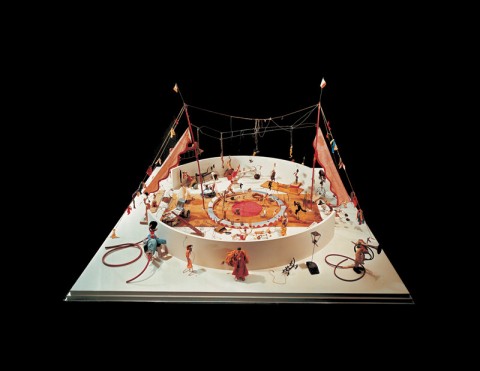Alexander Calder’s Calder’s Circus, a toy theater piece the artist constructed between 1926 and 1931, and performed for decades, has the rag bag appeal of a much-repaired stuffed animal who’s loved into a state of baldness. This charm presented conservators at the Whitney Museum of American Art with a unique set of challenges. Not only were the cloth and wire structures fragile with age, they’d taken a beating during the period when they were on active duty. Should the work be restored to its pristine state or should the artist’s clumsy, on-the-fly patch jobs be preserved as evidence of use?
As part of the restoration effort, the Whitney’s team of conservators, archivists and historians delved into circus history, learning that Calder’s ringmaster, tightrope dancer, bareback rider, and lion tamer were all based on circus stars of the period.
They also leaned on two films depicting the work in motion, Jean Painleve’s Le Grand Cirque Calder 1927 and Le Cirque de Calder by Carlos Vilardebo. But with more than two hundred live performances, it seemed a good bet that the characters could be manipulated in ways other than the ones captured on film. An acrobat who was consulted agreed, but also concluded that some of the moves of which these little wire figures were capable would be impossible for human beings.
As archivist Anita Duquette notes above, even in its restored state the Circus will now be a static affair, partly from the ongoing effort to conserve its delicate materials, but more because the master who apparently took such pleasure in bringing it to life is not available for an encore performance.
- Ayun Halliday will take a cork-wire-and-fabric-scrap tabletop circus over a 3D CGI any old day. Follow her @AyunHalliday



Leave a Reply